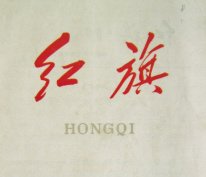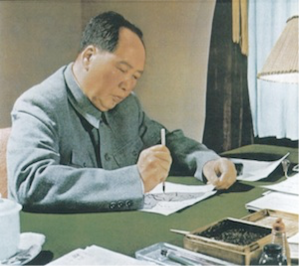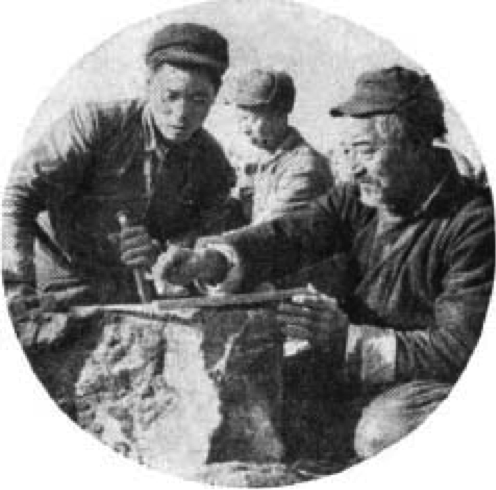
December 31 1965. New Year Editorial from Hongqi (Red Flag Magazine, the CCP’s main theoretical outlet). Also reprinted in the People’s Daily.
At play at the time:
This editorial, probably written by Mao’s close ally Chen Boda, strongly advocates putting politics in command, and helps to elucidate this core concept of Mao Zedong thought. It is a not so thinly veiled criticism of the Liu Shaoqi Deng Xiaoping wing of the party who favored a more market oriented approach for the Chinese economy. Hongqi’s editorials will gradually supplant those in the People’s Daily as the primary source for political summations of the Cultural Revolution.
The Political is the Commander, the Political is the Soul
People’s Daily 1965.12.31 Page 1
Red Flag magazine 1966 New Year’s Editorial
1966, A new year begins. In the past year the Chinese people continued to raise high the great red flag of Mao Zedong Thought, giving prominence to politics on every battlefront, as such it was a year of splendid achievements
Comrade Mao Zedong repeatedly instructed us; politics is the commander, the soul in everything “Not to have a correct political orientation is like not having a soul”① “Political work is the life-blood of all economic work.”②
To give prominence to politics, to put politics in command, is the emphasis of Mao Zedong thought, pragmatically study and use Mao Zedong Thought at the front of all work, and strengthen political work. In every kind of work, if you do this, then you can persist in the correct direction, you can prevail over every difficulty, and achieve remarkable accomplishments. Every time you do not do this or do it badly, then you certainly will not improve, or even follow an evil path. This is a truth repeatedly proven in our practice.
The relation between the political and economics, technical work and other services, and what position political work is put in, will impact the success or failure of our revolutionary and constructive policy and line questions.
Proletarian politics, reflects the fundamental interests of the overwhelming majority of the people. Our work is an integral part of the proletarian revolutionary cause. All work is subordinate to proletarian politics, all work is subordinate to the proletarian political line, and all work is at the service of proletarian politics. If it is not proletarian politics, then it is bourgeois politics. Economic, Military, Cultural, etc., politics that are not subordinate in truth do not exist. In reality, there are no economic politics, military politics, cultural politics, and so on, that are not subordinate. Lenin said: “without a correct political approach to the matter the given class will be unable to stay on top, and, consequently, will be incapable of solving its production problem either.”③ Thus we must continue to put politics in command, this fundamental principle of Marxism Leninism.
Comparing Political work and Economic work, Political work must come first. Comrade Mao Zedong has always stressed that politics is the concentrated expression of economics. Politics should lead economics, rather than economics leading politics. The so-called viewpoints of “good economy is good politics” and “good production is good politics” are wrong.
Comparing Political work and Military affairs, Political work must come first. The Military is only one tool for completing political tasks. Politics should lead military affairs, rather than military affairs leading politics.
Early in 1929 at the famous Gutian meeting, Comrade Mao Zedong resolved the problem of the relationship between military affairs and politics: Politics leads the military; it is not the other way around. The so-called viewpoint of “good military is good politics” is wrong.
Comparing political work and scientific work, political work must come first. Politics must lead science, rather than science leading politics. The so-called viewpoint of “good science is good politics” is wrong.
You can only arrange the relationship of politics with economics, military affairs, science and technology, and the relationship of political work with business, in this way.
Of course there are contradictions between political work and business. But to resolve this contradiction, we cannot weaken political work, or use the method of squeezing out political work. We can only give prominence to politics, strengthen political work, and place political work in front of professional work, in order to carry out business. By following this course politics can lead business, and allow business to advance.
Comrade Mao Zedong said politics “is the struggle of class against class.”⑤
In our country, who will win the battle of socialism versus capitalism still will have to experience a long historical period. In the world, Marxist Leninists and the revolutionary people are in a serious battle with American imperialists, reactionaries and modern revisions from every country. This is the class struggle on a global scale.
In this situation, raising politics to prominence requires us to always be alert for class enemies internally and externally. On every battlefront we must grasp the class struggle, grasp the battle of the two roads of socialism and capitalism, and implement and carry out the party’s class line. Only by doing this can we advance and consolidate the dictatorship of the proletariat, so that our cause can healthily advance along the socialist road, and remain invincible, and more effectively support the revolutionary struggle of the people of the world. If we forget the class struggle, forget the two-line struggle, our work will lose direction, revisionism will arise, capitalism will get the upper hand, and our cause will change appearance.
Comrade Mao Zedong said, “Politics mean class politics, the politics of the masses.”⑤ Departing from the mass struggle is not politics.
Now, our fundamental task is to make the socialist revolution to the end, and continuously push forward socialist construction. To accomplish this task, we must mobilize the masses, and rely on the masses. To accomplish this, the most fundamental thing is to arm the people’s minds with Mao Zedong Thought to increase public awareness and mobilize the revolutionary enthusiasm of the masses, to make their talents come out, and fully develop the peoples’ role.
Learning and using Mao Zedong thought, revolutionizes people’s thinking, it is the guarantee of good work. The masses of workers and peasants said it well: “Mao Zedong thought arms the people’s minds, makes the people’s hearts red, eyes bright, guts strong (brave), bones hard.” “If you have Mao Zedong thought in your brain, then you will not be scared away by difficulties, or bent aside by snags.” Mao Zedong thought is the greatest weapon and the greatest political power. The people who use the weapons of Mao Zedong thought have the greatest fighting strength.
Under the teachings of Mao Zedong thought have arisen the heoric people of Daqing, and the heroic people of Dazhai, on every battlefront many Lei Fengs have arisen, and communist soldiers such as Wang Jieshi. With self-reliance they struggle arduously and work energetically for the prosperity of the country. They do not fear hardship, they do not fear death. They work wholeheartedly for the revolution; they give everything for the revolution.
No matter what task, no matter what job, they all cherish the motherland, and view the world broadly.
They care about national affairs, party affairs, class affairs, and the affairs of the people, and international affairs. They care the most about politics. They understand the political goal and meaning of their work, and can self-consciously follow general political tasks. They can bring every specific task together with political undertakings, and bring every bit of commonplace work together with communist ideals. The Chinese people’s spirited appearance is the result of Mao Zedong thought being deeply rooted in their hearts.
The material becomes spiritual, and the spiritual can also become material. People’s spirited appearance towards any work has a resolved meaning.
You only need to grasp Mao Zedong thought, and give prominence to politics, and then production will go well, technology will go well, and enterprises will go well. If you do not put politics in the lead then production, technology, and enterprise will not go well. In fact it is like this. Once Mao Zedong thought has been grasped by the great masses of the people then it transforms into a great material force.
Modern revisionists oppose putting politics in command. They advocate “material incentives,” “profit incentives,” “award incentives,” and the development of bourgeois individualist egoism. Lenin once pointed out: Work to make money… this is the ethic of the capitalist world.”(6) Modern Revisionists precisely pursue this sort of ethic of the capitalist world.
A soul of proletarian politics that puts politics in command, or a soul of material incentives that puts individual fame and profit in command, represent two fundamentally opposed world views. Are they two fundamentally opposed political lines? We put forward the political, put politics in front, this is persisting upon the proletarian worldview, opposing the capitalist world view in supporting the Marxist Leninist political line, opposing the revisionist political line.
China’s third five year plan has begun. In the age of the new battle, as long as we continue to put politics in front in all forms of work, and continue to put the living and learning of Mao Zedong thought in the first place the people will continually revolutionize their thought, and undoubtedly will achieve new and greater achievements.
① Mao Zedong”On the Correct Handling of Contradictions Among the People.” 1957. https://www.marxists.org/reference/archive/mao/selected-works/volume-5/mswv5_58.htm
② Mao Zedong”Editor’s Notes From Socialist Upsurge In China’s Countryside.” 1948.https://www.marxists.org/reference/archive/mao/selected-works/volume-5/mswv5_48.htm)
③ Once Again On The Trade Unions, https://www.marxists.org/archive/lenin/works/1921/jan/25.htm
④⑤ “Talks At The Yenan Forum On Literature And Art.” 1942. https://www.marxists.org/reference/archive/mao/selected-works/volume-3/mswv3_08.htm
⑥ Lenin” Report on the joint meeting of the All-Russian Central Executive Committee.”1918.



 In addition, the Chinese embassy in the city of Medan in North Dumatra, Indonesia has issued a notice to the Indonesian ambassador to China strongly condemning the rightist violence fomented against overseas Chinese, resulting in people being massacred and rapes, as well as large-scale looting of Chinese property. The military leadership is implicated, recent news has been hard to secure as a result of the suspension of normal communication with the Chinese consulate in North Sumatra.
In addition, the Chinese embassy in the city of Medan in North Dumatra, Indonesia has issued a notice to the Indonesian ambassador to China strongly condemning the rightist violence fomented against overseas Chinese, resulting in people being massacred and rapes, as well as large-scale looting of Chinese property. The military leadership is implicated, recent news has been hard to secure as a result of the suspension of normal communication with the Chinese consulate in North Sumatra.


